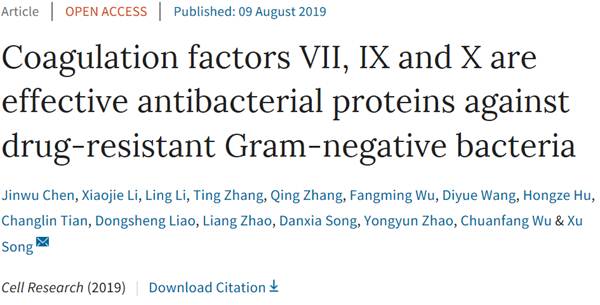Professor Xu Song’s team at School of Life Sciences has published an article “Coagulation factors VII, IX and X are antibacterial proteins against drug-resistant Gram-negative Bacteria” in Cell Research ( IF 17.86 ). The first authors are associate professor Jinwu Chen; Xiaojie Li, a doctoral student; Ling Li, an associate research fellow; Ting Zhang, a master; and associate professor Qing Zhang. Professor Xu Song is the corresponding author. Springer Nature has held an international press conference for the publication of this article. The discovery has been reported in Chinese media such as Xinhua, China Net, CCTV, CNR.CN, Sina, Netease, Science Net and 86 overseas media. This study shows that coagulation factors VII, IX and X not only have coagulation function, but also are natural anti-superbugs proteins in human body.


Infections caused by drug-resistant “superbugs” pose an urgent public health threat due to the lack of effective drugs. Compared with Gram-positive bacteria, Gram-negative bacteria are more difficult to kill because of the presence of outer membrane ( mainly composed of LPS (lipopolysaccharide, also known as endotoxin ). In 2017, the World Health Organization (WHO) listed 12 bacteria that pose the greatest threat to human health because of their resistance to antibiotics; among them, three carbapenem-resistant Gram-negative bacteria, Acinetobacter baumannii, Pseudomonas aeruginosa and Enterobacteriaceae, are considered to be of critical priority.However, no new antibiotics have been found since 1987. Now 700,000 people die from drug-resistant bacterial infections every year. Without better solutions, the number of deaths per year will reach 10 million in 2050. In previous studies, Professor Xu Song's team unexpectedly found that the light chain protein of coagulation factor VII ( lFVII ) has bacteriostatic activity against E. coli, which indicates that FVII and other members of the coagulation factor family may not only act on coagulation, but also are multifunctional proteins.

The authors state in the abstract : “Through decoding a unique mechanism whereby factors VII, IX and X behave as antimicrobial proteins, this study advances our understanding of the coagulation system in host defense, and suggests that these factors may participate in the pathogenesis of coagulation disorder-related diseases such as sepsis via their dual functions in blood coagulation and resistance to infection. Furthermore, this study may offer new strategies for combating Gram-negative ‘superbugs’.”
To read the article, please visit the following link https://www.nature.com/articles/s41422-019-0202-3
